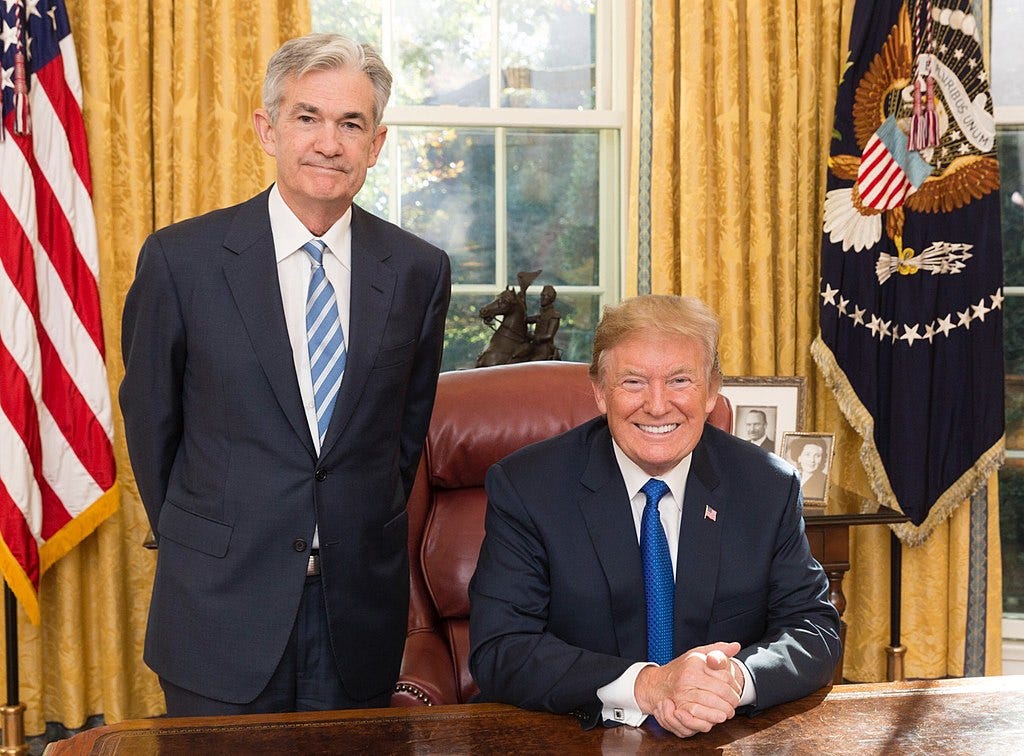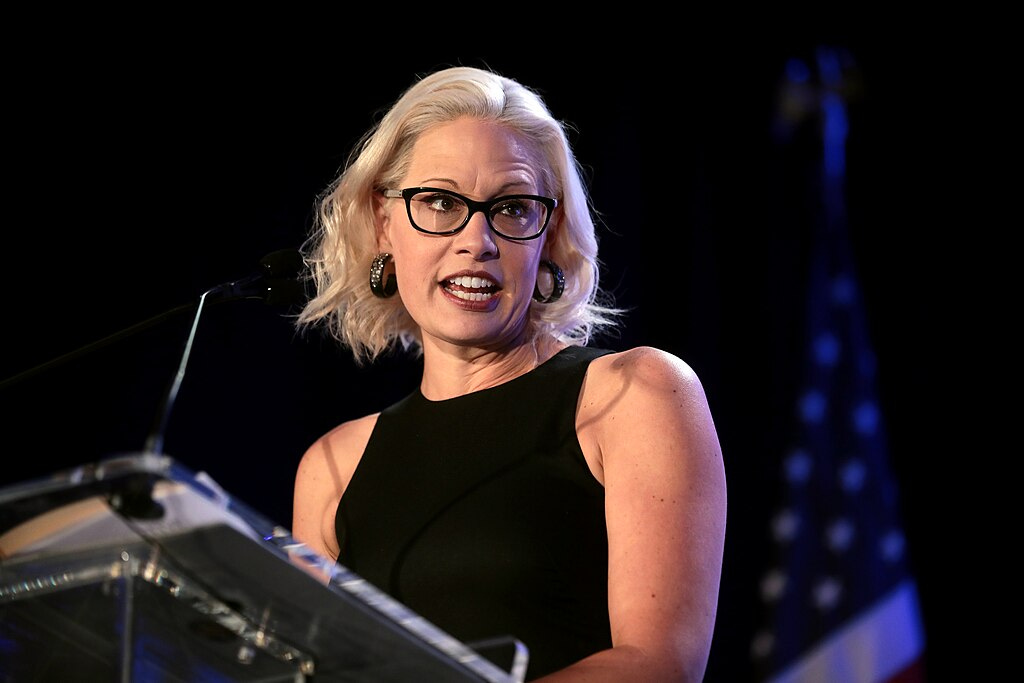Trail Notes
Tariff price hikes start to kick in / Will Trump kick Fed chair out? / Congress pulls plug on public broadcasting / Former Sen. Sinema's spending spree / More NIH drama

Tariff price hikes start to kick in
It still may be too early to know if and how much Donald Trump’s tariffs will drive up prices, but the latest data are heading in the wrong direction if you’re living in the White House.
The Consumer Price Index in June was 2.7 percent higher than what it was a year ago, the sharpest increase since February. That’s higher than expected and up from an annual pace of 2.4 percent in May. Some of the bigger price bumps were for appliances, home furnishings and clothing. Gas and food prices also jumped.
This creeping inflation increases the likelihood that the Federal Reserve will not lower interest rates when it meets at the end of the month, which, in turn, increases the likelihood that the president once more will unload on Fed Chair Jerome Powell.
Will Trump kick the Fed chair out?
Speaking of Powell, it should come as no surprise that the president cranked up the noise about the prospect of dumping him. With the Jeffrey Epstein conspiracy debacle roiling the MAGA mob, Trump badly needs a distraction, something he’s quite good at creating. So, during a meeting with a group of House Republicans in the Oval Office Tuesday night, he pulled out a piece of paper that had nothing to do with the legislation they were there to discuss.
It was a letter, he said, in which, in the spirit of “The Apprentice,” he tells Powell he’s fired. Trump polled those in the room as to whether he should send it, knowing full well that his theatrical display of confidentiality wouldn’t stay confidential for long. Sure enough, while the meeting was still going on, Florida Rep. Anna Paulina Luna (who introduced a bill in January to carve Trump’s mug at Mount Rushmore) posted on X, “Jerome Powell is going to be fired. Firing is imminent.”
Then, on Wednesday, in response to a reporter’s question, the president said that booting Powell was “highly unlikely” and “we’re not planning on doing anything.”
In truth he already had. Not only did Trump create a “will he, won’t he?” reality TV scenario that could turn the cameras away from that Epstein client list unpleasantness, but he also reminded the country who the real villain will be if the economy sours—all without imploding Wall Street.
Congress pulls the plug on public broadcasting
With the One Big Beautiful Bill Act signed and sealed and once tough-talking Republicans in Congress toppled like dominoes, this week’s focus has been on a rarely used process called rescissions. This is when Congress, at the president’s request, “claws” back money it already appropriated, and in this case, it means giving official blessing to turning on the Department of Government Efficiency (aka DOGE) chainsaw. Specifically, the lawmakers would codify DOGE hacks to U.S. foreign aid and public broadcasting.
Ultimately, both the Senate and House wiped out $7.9 billion that had been allocated for foreign aid and another $1.1 billion that was earmarked for the Corporation for Public Broadcasting, which it would then pass on to PBS and NPR. The Senate did restore $400 million to the President’s Emergency Plan for AIDS Relief (PEPFAR) after Maine Sen. Susan “I’m concerned” Collins expressed, well, concern over the potential shutdown of the lauded worldwide HIV and AIDS relief package initiated during the George W. Bush administration.
Passing this rescissions package means that, for the first time since 1967, Washington will not be providing financial support for public broadcasting. PBS gets 15 percent of its budget from the federal government. NPR gets not quite 2 percent directly but also relies on member stations paying for programming with federal money they receive.
During the debate, Democratic senators, all of whom voted against the rescissions, warned that the funding loss would put many stations in rural areas at risk, and that could affect the ability of remote communities to have access to emergency alerts. But for Trump, it’s a Macho Man moment. On May 1, he signed an executive order “ending taxpayer subsidization of biased media.” More recently, he called public broadcasting a “monstrosity.”
Life-saving biscuits go up in smoke
Sometime in the next few weeks, more than 550 tons of food—enough to feed 1.5 million children for a week—will be incinerated because it was never shipped. Why? The Trump administration dismantled U.S. foreign aid programs.
The food—high energy biscuits—were purchased as a stopgap measure during the Biden administration to feed children in Afghanistan and Pakistan. But once DOGE drastically scaled back USAID, the biscuits were never moved out of the Dubai warehouse where they were stored. Their expiration date was Tuesday. It cost $800,000 to purchase the biscuits. It will cost $130,000 to destroy them.
Former Sen. Sinema’s suspect spending spree
Krysten Sinema, the Arizona Democrat turned independent, is no longer a member of the Senate, but that hasn’t stopped her from tapping into the money pile she raised during her last campaign. According to documents filed with the Federal Election Commission, Sinema, now a lobbyist with the law firm Hogan Lovells, racked up more than $390,000 in expenses paid by her campaign committee between March 31 and June 30.

Former political candidates can legally keep operating their old campaign committees for what are considered legitimate political purposes, such as paying down campaign debts. But Sinema’s spending spree clearly raises questions about whether she’s staying within the limits of the law.
Her expenses included:
More than $71,000 for airline tickets and related expenses, including in-cabin Wi-Fi and airport lounge access;
$4,662.33 for event tickets for her “security detail”;
A total of $2,020.88 for wine at five occasions;
$1,303.17 for “security protective equipment” purchased at Ed’s Gun Shop in Vess, North Carolina;
$616 for “security detail ski tickets” in Aspen, Colorado; and
$352 for Healthy Images, a “naturally based wellness provider” in Cave Center, Arizona.
More drama at NIH
Just three months into the job, National Institutes of Health (NIH) Chief Operating Officer Eric Schnabel was fired and walked out the building Monday. It seems that a $3.3 million NIH contract for work on autism and other subjects was awarded to a Louisiana company where his wife, Trish, was on the staff. Schnabel did contact a Washington Post reporter who had reached out to him, texting, “I need your help. I didn’t do what they said I did. This was a political hit job. Please call me.” But Schnabel didn’t answer a follow-up call or respond to a text.
The White House plays the fool
The White House is so intent on promoting Robert F. Kennedy Jr.’s “Make America Healthy Again” mantra that it issued a press release Monday celebrating what it said was a decision by the iconic In-N-Out Burger restaurant chain to switch from sunflower oil to beef tallow to cook its French fries. One of Kennedy’s top priorities is to stop the food industry and restaurants from using seed oils, which he claims are “poisoning” America. But alas, In-N-Out is still using sunflower oil. The beef tallow thing was just an April Fool’s Day joke.
Randy Rieland is a former columnist at Smithsonian magazine, website director at the Discovery Channel, and senior writer at Washingtonian magazine.
Money Trail is a fiscally sponsored project of the Alternative Newsweekly Foundation, a 501(c)(3) public charity, EIN 30-0100369. Donations are tax-deductible to the extent allowed by law.




